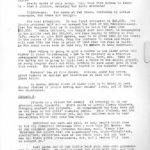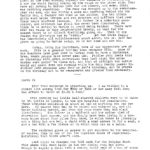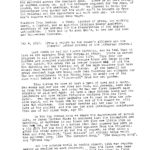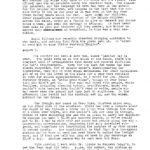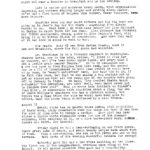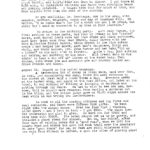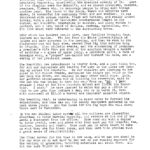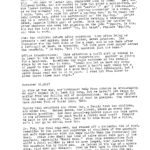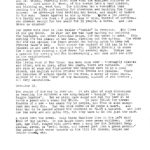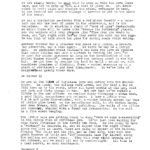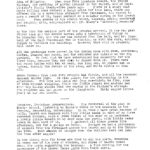Pine Mountain Settlement School
Series 09: Biography – Staff/Personnel
Series 07: Directors
EVELYN K. WELLS 1917 PMSS STAFF TRANSCRIPTIONS
Evelyn K. Wells: Secretary 1916 – 1931, Acting Director 1931
TAGS: Evelyn K. Wells 1917 Transcriptions ; Evelyn K. Wells ; Pine Mountain Settlement School ; correspondence ; PMSS early history ; The Road ; fundraising ; Celia Cathcart ; Ethel de Long ; model housekeeping ; sleeping porches ; Community Christmas Tree ; Dr. Abby Little ; Fiddler John Lewis ; Belgian Relief Fund ; Incline Railway ; Mary Sinclair Burkham Memorial Schoolhouse I ; Laurel House I ; cows ; chickens ; ballad singing ; WWI ; Election Day ; Katherine Pettit ; Far House ; Marguerite Butler ; the Draft ; Leon Deschamps ; Uncle William Creech ; bean-stringings ; set-runnings ; Aunt Sal Creech ; Red Cross knitting ; Aunt Judy Turner ; Community Fair Days ; Student Labor system ; Uncle John Shell ; Mr. Luigi Zande ; Margaret Walker ; Thanksgiving Day ; children’s pageants ; Christmas preparations ;
TRANSCRIPTIONS: Evelyn K. Wells 1917 Transcriptions
1917 Winter. [034-p.1] Twenty sacks of mail today. They took five horses to fetch it — what a picture, crossing the snowy mountain!
Winter
Twenty sacks of mail today. They took five horses to fetch it —what a picture, crossing the snowy mountain!
Chicken-pox. Six cases at Far House, including my little room-mate, who broke out tonight.
The Road situation: It was first estimated at $10,000. The County promised half and we assumed the rest of the responsibility. Then the engineer told us it couldn’t be built for less than $50,000. Celia Cathcart, who taught here last year, is campaigning in the Middle West for $25,000, and Miss [Ethel] de Long is trying to find fifty people to give $500 apiece, same to be given back by the County in the course of 20 years, from the increase in state aid which will come with the rise in price of land when the road is built. As the money comes back in this way, we return it into endowment.
Miss de Long is going to give a course to the older girls this winter in model housekeeping – how to be sanitary in a two-room news-papered house, where to have your well, barn, etc. Then in the spring she is going to build such a house [Practice House] on the school grounds, as young couples start out with, putting no more money into it than they would. She outlined such a course at the workers’ meeting.
Workers’ tea at Pole House: sitting under the trees; great baskets of dahlias and calendulas at each end of the long plank table.
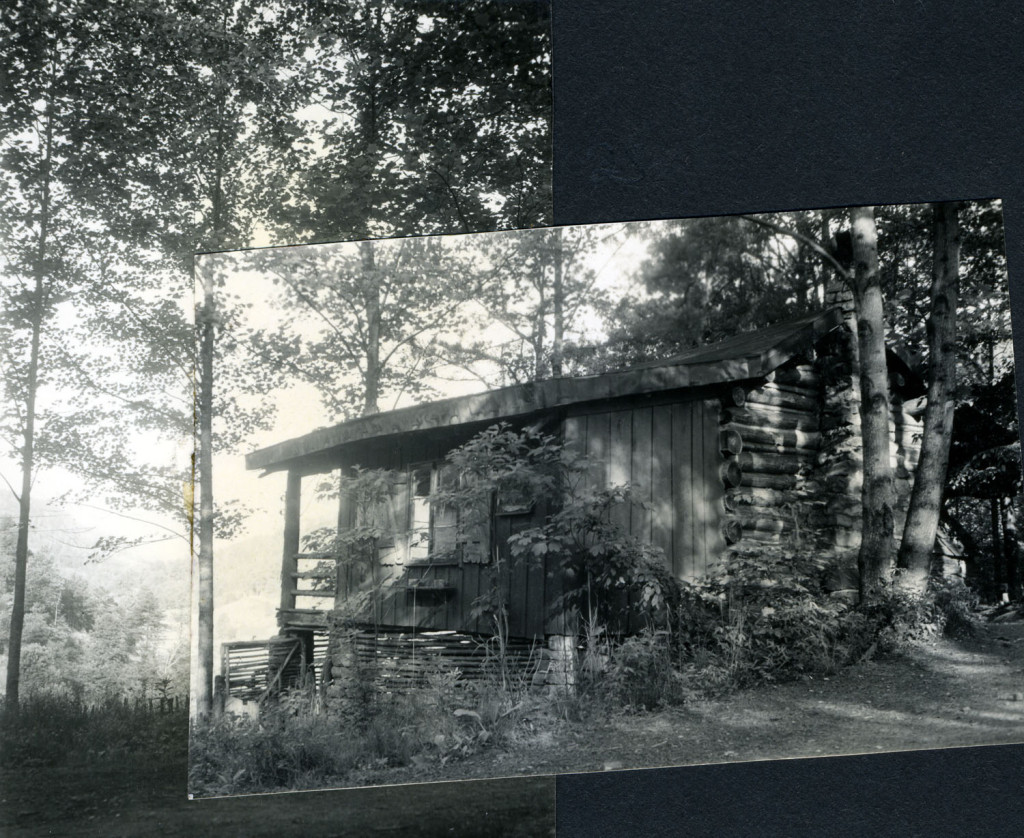
II_14-02_pole_house_0482b/c.jpg
My Sunday School class of older boys is to bring in next Sunday stories of people saving each others’ lives, out of their own experience.
1917 January 6. [034-pp.1-2] (Thanks to a friend for money.) We invested it in our greatest need, blankets.
(Thanks to a friend for money.) We invested it in our greatest need, blankets. Eight pairs of lovely fleecy blankets, bringing comfort and pleasure. On clean-sheet day they were put on the beds on the girls’ sleeping porch. Nine o’clock, and the sun isn’t over the mountain yet, and the children have to wear bed-mittens while they make the beds.
Christmas was warm and mild, so many people could come to the big Community Christmas Tree – more than 500 there. One of our neighbor guests, Jonathan Gilliam, said, “Pears like Christmas has allers been the slambangin’est, chair-flingin’est, shootin’est, killin’est time of the whole year, but you ‘uns has had three civil Christmases, now, and I reckon I’ll come up amongst ye.”
Last night one of our little boys [Almon Huff] came down with pneumonia and is quite sick. Dr. Little [Dr. Abby Little] spent the night with him, and this morning I rode to his home to tell his family. They live on Gabes’ Branch, a wild, remote little creek, and as I climbed the [p.2] ridge into the sunlight and looked back on our valley, and then ahead at the road winding through the thickets of rhododendron, I saw the whole family coming up the ridge on the other side. They were all moving to Harlan Town for the winter, and every child was carrying something. The rear was brought up by the seventeen-year-old son, who was riding a mule and carrying behind him the family bed, a feather bed tied in the middle. The two little girls wore brown dresses and red sweaters and mufflers tied over their heads mountain fashion. The father is a notorious moon-shiner, and although his still has never been discovered, we think he is moving to Harlan to avoid being raided. There have been two raids in this neighborhood lately, so that for the moment there is no illicit distilling going on. That is one reason why Christmas was so “civil.” But the whole family was immediately all solicitousness about Almon, and Mr. Huff has given up going to Harlan today, so he can come and see him.
Today, being Old Christmas, none of our carpenters are at work. This is a greater holiday than December 25th. Some of the teachers have gone over to Turkey Fork to have a Christmas tree, where people have never seen one. Fiddler John Lewis told us yesterday with great conviction that last night the alder bushes were aimin’ to bloom out, and that at midnight the cattle would all kneel down and worship while the Holy Family passed by. Fiddler John explains Leap Year as Job’s birthday, and he prayed on his birthday not to be remembered any oftener than necessary.
1917 March 21. [035-p.2] This road campaign is absorbing us. I am writing to a picked list asking them for $500 or $100 or how many feet they can afford to build at $1.89 a foot.
This road campaign [Laden Trail or The Road] is absorbing us. I am writing, to a picked list asking them for $500 or $100 or how many feet they can afford to build at $1.89 a foot.
This morning two little half-starved children were to be taken by Dr. Little to London [London, KY], to the eye hospital for examination. Their wretched condition is about as bad as anything you can see here. Of course they had to be bathed and cleaned up, and all their clothing burned, and then the room where they had slept disinfected. The father is a half-wit and the mother died of starvation last summer, and the family have been living in a two-room house about four miles from here, in which there is literally not a thing but one bed, a chair with a slab across it for a seat, a and a box with a few dishes on it which they use as a table.
The railroad gives us passes to get children to the hospital. Of course, this is one of the few hopeless cases of degeneracy. Surprising that there aren’t more.
Last night we reached the $108 mark for the Belgian [Relief] Fund. This means that each table in the new dining room has given enough to supply a child with a second daily meal of a cup of cocoa and a biscuit. This sum means more than a dollar per capita per child here. Tell that to the people who say, “too many other demands to help the war victims.”
1917 May 4. [036-p.3] (From a report to the Women’s Alliance and the Cheerful Letter Society of the Unitarian Church). Last month we had our fourth birthday, and we feel that at last we are emerging from the chrysalis stage.
The Incline (Railway across the mountain built to take out lumber) may be taken up any day, and our last rail connection with the railroad across the mountain, gone. There is no more freight or express coming in. All the stronger argument for the Road, of course, but in the meantime, what? We planned to build the Schoolhouse this summer but the stuff can’t be brought in from the railroad and the carpenters all want more pay. We simply can’t compete with mining camp wages.
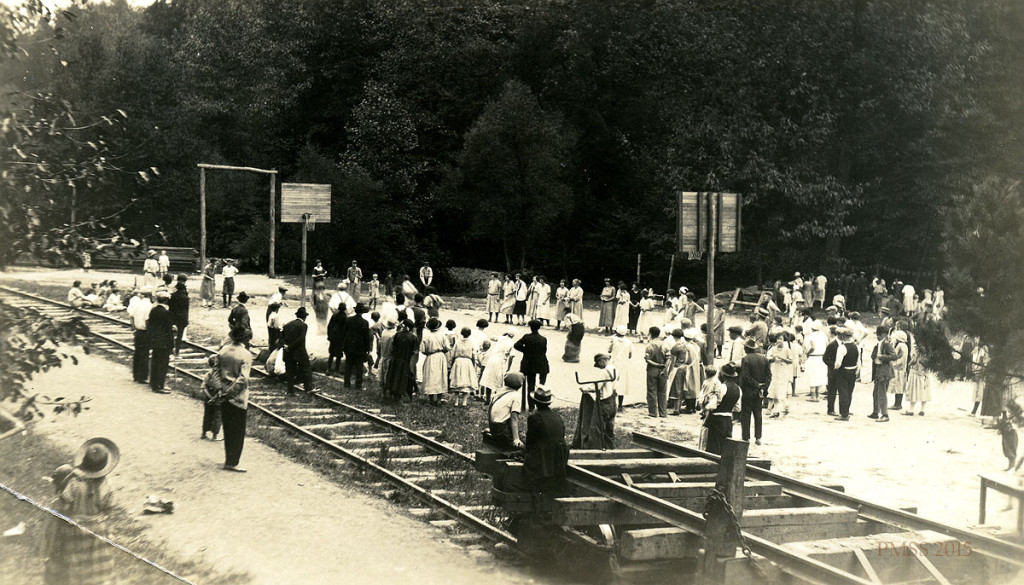
Logging railroad tracks at Playground. (Later removed) [kingman_031c]
Visitors from Boston: a Thorp (sister of Erica, [Erica Thorp, teacher] now working here), a Thaxter, and an Appleton (William Sumner Appleton, secretary of the Society for the Preservation of New England Antiquities. I took him up to Aunt Sal‘s, to see her old loom and hand-woven blankets.
1917 May 4. [036-037-pp.3-4] (From a report to the Women’s Alliance and the Cheerful Letter Society of the Unitarian Church.)
(From a report to the Women’s Alliance and the Cheerful Letter Society of the Unitarian Church.)
Last month we had our fourth birthday, and we feel that at last we are emerging from the chrysalis stage. There is marked progress in all phases of the school life. This year our furrows are ploughed straighter because there are fewer stones in the fields; the creek bed is deeper because of all the box ditching and the blasting out of the huge boulders that have caused back waters to flood the fields. At the Sawmill our great chestnut logs are being made into flooring and shingles for the new schoolhouse [Mary Sinclair Burkham Memorial Schoolhouse I]; in the dining room, [Laurel House I] on every one of the nine round tables is a “flower-pot” from our own garden.
This spring we have at last a herd of cows and a dairy. Two weeks ago our six new cows and bull, all Jerseys, were sent up from the Bluegrass, and today we had our first dessert made entirely of milk and eggs, we have a large chicken house and two incubators and have raised fifty-six chickens from the first batch. Two hundred more Leghorns [See: Dancing in the Cabbage Patch IV: Poultry] are to come in from the outside world, and we think by the end of the summer we will have 400 chickens. One worker devotes all her time to the care of the poultry and she has the most intelligent assistance from one of our older boys, age 15.
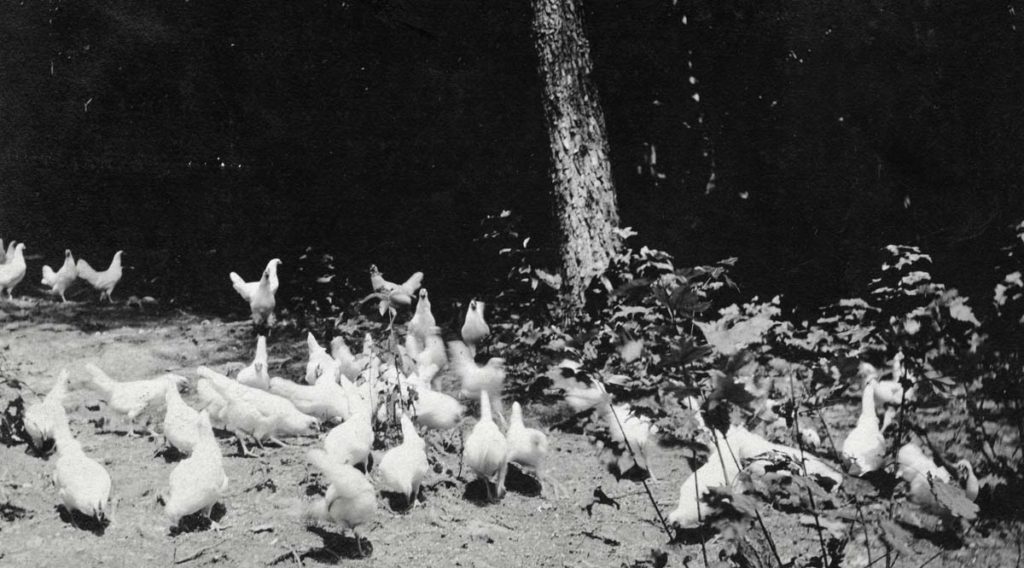
Poultry. White leghorns. Katherine Pettit Album I.
In the big dining room we share the experiences of school life, as James Madison rises to announce that the incubators are hatching, or Harrison to say there are five new little pigs in the nests lot, or there is a notice read that someone has sent in a big gift for the Road Fund (loud applause from the children). After the brief service at the end -of supper, we stay twice a week and sing ballads, “love ditties” and anticky [antique] songs which the children love, like “The Barnyard Song,” “The Swapping Song” and “Ground Hog.“
But the outside world is coming closer, with war [WWI] reports making us realize we must retrench. When the first news came in, Green Bailey, age nine, announced that “he aimed to fight for his country.” When we asked him what that country was, he answered, “Why, Wallins Creek, Kentucky.” Today a flag flies from every house on the school grounds. One of the ten-year-olds, drilled in the proper observance of the colors, raises and furls the main school flag at morning and night, as ceremonious as any West Pointer.
[p.4] Once a week there is a “working” at one of the houses. The women of the neighborhood, meet to knit for the French wounded, and needles fly while they talk of the crops and the recent “tide” (flood) and the enlistments among the mountain boys. The community interest, and the campaign we have had here in the school for the Belgian children, are witness to the fact that the outside world is not as far away as it was even on the day when Green Bailey heard about the war. Last month our children, their sympathies aroused by stories of the hungry children across the water, voted as a family to give up dessert and butter twice a week, and send the savings to Belgium. We have never been able to give our children all they needed, and butter is served only at breakfast, to [sic so] this was a real sacrifice.
Small William was recently observed bringing a matchbox to the table, and putting food from his “plate into it. He “aimed to send hit to some little starving “Belgium”.
1917 August 5. [037-p.4] The country can settle down now, since ‘Lection Day’ is over…
The country can settle down now, since ‘Lection Day is over. The polls were up at the House in the Woods, where the simplest kind of arrangements with boxes and benches fulfilled the law’s requirements. Work for the last few weeks has been almost suspended, for if people weren’t electioneering for themselves, they did it with equal enthusiasm for their candidates. All of us who had lived in the state for a year were entitled to vote for school superintendent, so I voted for Mrs. Jennie Forester Creech, an “awful good woman”, though we hear today that she didn’t get it. The road was lined with people, whole families, including sleeping babies, grandfathers, women who couldn’t vote because they couldn’t read or write, people who had never seen the school and came just to sight-see. In the afternoon Miss Pettit [Katherine Pettit, Co-Director] had the victrola set up, and the women knitted for Red Cross.
Our freight now comes in from Chad, fourteen miles away, on the other side of the mountain. There has been a dispute about the right of way through a creek bed which runs through the farm of a widow over there, and she wouldn’t let our team go through, unless we were employing the man who is going to marry her daughter. He charges too much — $1.25 per hundred pounds, so we’re really put to it. I had to ride over and sound out people along the way –interesting conversations, beginning with many unrelated subjects, and sometimes not introducing the purpose of my ride unless it seemed timely. One complication is that Chad is a non-agency station and we have to send men over there to unload the freight cars, and if they are held too long we have to pay demurrage at $5.00 a day. Another reason why we must have the Road [Laden Trail or The Road].
This morning I went with Dr. Little [Dr. Abby Little] to Kenneth Nolan’s, to see the four days old baby. Alice, [Alice Nolan] the mother, was sitting up in bed, and her sister, the frailest slip of a thing with curly hair, was combing out Alice’s abundant locks. They are thrilled about the baby. Just before it came, Kenneth tiptoed to the head of the bed and removed the gun, which was standing on end nearby, saying, “hit might go off.”
1917 August 10. [038-p.5] And really cool now. I sleep under two blankets at night and wear a sweater to breakfast and in the evening.
And really cool now. I sleep under two blankets at night and wear a sweater to breakfast and in the evening.
Life is easier and smoother every month, with organization improving and workers staying longer and getting along faster. we’ve had a fine bunch of helpers this summer, fewer visitors, [with] more leisure.
Sometime soon the Far House workers and the big boys are going up to Jack’s Gap for the night – something I’ve always wanted to do. Next week I go with Miss [Marguerite] Butler and Miss [Celia] Cathcart to Harlan to raise $2500 for the Road, Miss Cathcart has finished her $1250 assignment, which, added to Miss De Long’s fund, will bring it up to within $5,000 of completion. And more than half of it has come in since we went to war.
The Draft: only 45 men from Harlan County, none in Lee and Breathitt, where the full quota had enlisted.
Leon Deschamps is in a forestry regiment in Washington. Chester Lewis, now in the army, writes, “I jined to fite for my country, and I’ve been moved three times, and every time I get a leetle grain nearer France.” He is in Lexington now. A new boy came in from Kingdom Come last week, and the second day in a fit of homesickness he told Miss Pettit he would have to go home. — he “wasn’t satisfied” here. She told him to go, if he felt like that, but that he was making a big mistake not to get an education when all the young men of the country were going off to Germany to fight. He said, “The United States haint a-fightin’ the Germanies, are hit? Well, word haint never got to Kingdom Come yit.” When we wrote this incident to Filene’s Flag Shop, in connection with inquiries about a flag, for one of Uncle William [Creech]‘s grandsons who has a district school, the result was a flag twice the size he would have been able to afford, half the money being contributed by a kind friend.
1917 August 12. [038-039 p.5-6] Sewing class tea on Laurel House I porch, with exhibition of their work, truly remarkable when you think how hard it has been for most of them even to manage a needle…
Sewing class tea on Laurel House porch, with exhibition of their work, truly remarkable when you think how hard it has been for most of them even to manage a needle. Each girl has made either a little white ripplette [?] dress for one of the younger children, with smocking on it, or a nice three-piece suit, middie blouse and skirt, for herself.
Friday night we had a bean-stringing on our front porch. Three great tubs of beans, and about twenty people made short work of them. Then a set-running, one set on the porch and one on the terrace. Both parts of the evening wonderful outlets for energy.
Saturday Aunt Sal had a Red Cross knitting at her house. The first one in the neighborhood, previous ones being at the School. We all gained pointers from Aunt Sal’s hospitality. All this week her grandchildren have been helping her scrub and sweep and garnish. She scoured her floors and sanded them, moved [p.6] the bed out of the kitchen, put down clean newspapers on her shelves, Uncle William said, “Sal aims to have fifty women. She’s giv’ it out clear over onto the Poor Fork (across Pine Mountain.)” She had [estimated] about thirty, and thirty-four sat down to dinner. I got there at 3:30 p.m., to distribute knitting and found them stringing beans and peeling potatoes. I helped with that for about an hour, and then knitted with them the rest of the morning.
We are outfitting Mr. Deschamps [Leon Deschamps, forester and farmer], now in the army, with sweater, muffler, wristers, socks and cap of homespun wool. He writes, “l am Uncle Sam’s boy for a month now and I am proud, but every day I send my souvenirs to my home at Pine Mountain.”
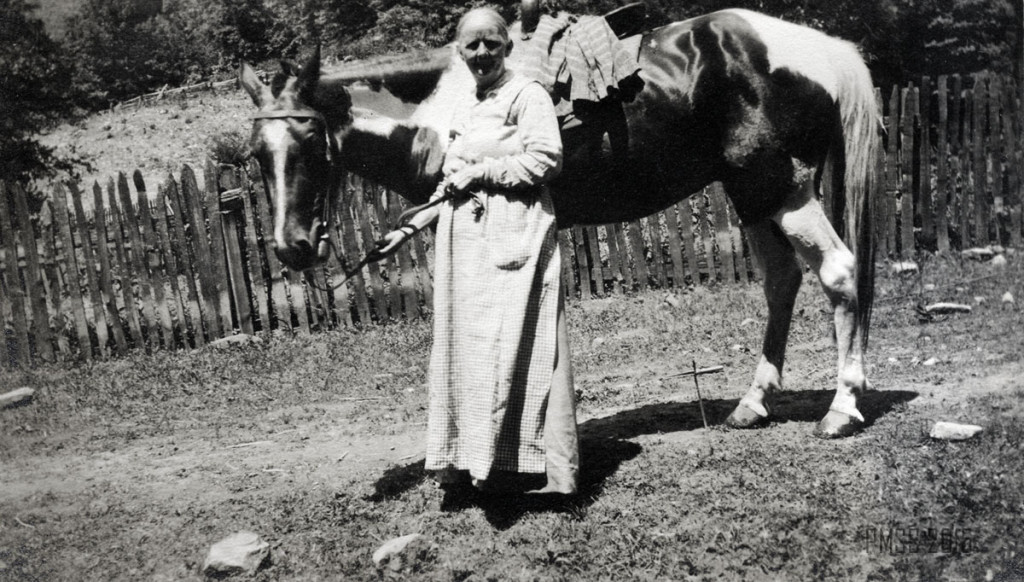
0049b P. Roettinger Album.”Aunt Judy Turner and the ‘pied nag.'” [Woman standing in front of a horse, fence in background.]
To return to the knitting party. Aunt Judy Turner, the first settler in these parts, had come up Greasy on her “pieded” horse, Aunt Rachel Lewis wore her blue dress and black sunbonnet, Aunt Lucy Dixon came from Bear Branch, Sally Harris with her baby Katherine Pettit Harris, Delia Creech in the blue cotton crepe I had helped her smock, Aunt Sal’s daughters, Polly [Polly Creech …] and Rhody [Rhoda Creech …], and their babies, Mrs. John Turner and her baby, “ill as a hornet” as she said when it fretted. Quite a day, just sitting and talking and knitting by the hour. [Uncle] William Creech said he was aimin’ to take a day off an’ listen at the women talk. Then dinner, with stack pie and moccasin pie and country butter and fried chicken and honey.
1917 August 20. [039-p.6] Report on the Harlan campaign. A tremendous lot of money is being made, hand over fist, in coal, and campaigning was easy, since you meet everyone on the street at least half a dozen times a day.
Report on the Harlan [Road] campaign.
A tremendous lot of money is being made, hand over fist, in coal, and campaigning was easy, since you meet everyone on the street [in Harlan] at least half a dozen times a day. Everyone meets at the barber shop, and again at the Post Office, and later at the hotel, to say nothing of sitting or lounging in doorways and putting through big deals. We had to wait to see one man, however, till he should have returned from hunting a murderer out in the hills, and the police judge gave us $35.00 right across his desk while he was trying two law-breakers.
We went to all the leading citizens and big firms and coal companies, and there were fifteen $100 gifts. We went right into the mining camps. From the four that I visited, miles apart – and I went on foot – I got $400. The whole town was interested and glad to give. We were out for $2500 and came back with $3300. The hotel people put us up as guests, and included a plank steak for dinner. But, oh, the relief, after four days of raising money for a “good road”, when we left the county road and struck the good old rock trail over the mountain! No more “good roads” for me, my feet are still blistered with the walk from Wilhoit to Harlan, a good six miles of glaring pike!
1917 September 30. [040-041-pp.7-8] Gorgeous cold weather today, after an equinoctial storm this week.
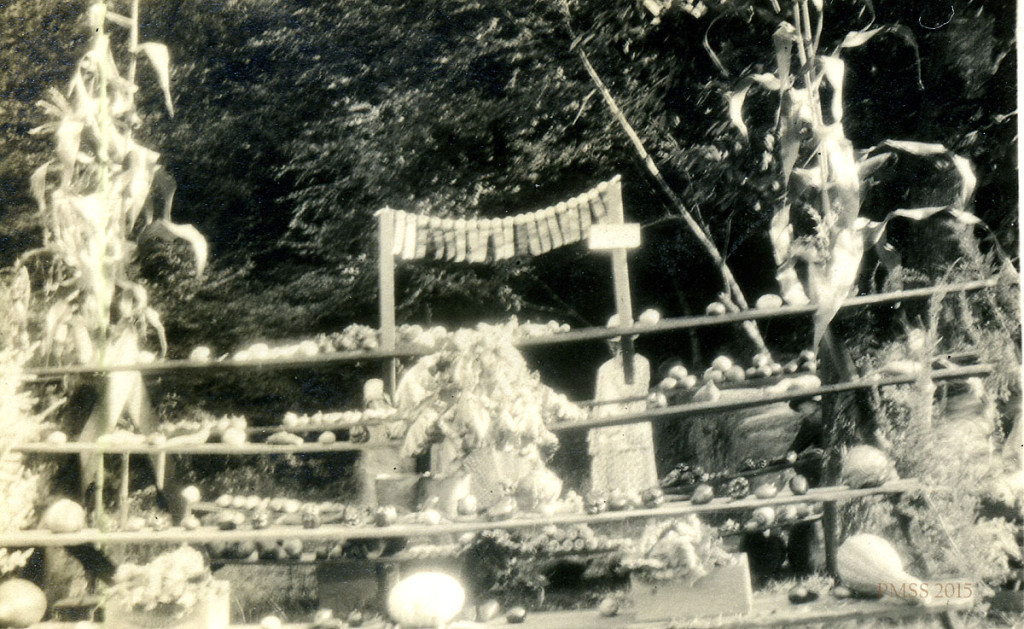
Fair Day display. [kingman_002c]
Gorgeous cold, weather today, after an equinoctial storm this week. Yesterday came the first Harlan County Fair at the school [1917 Community Fair Day], a most promising beginning, considering the absolute novelty of it. Lots of the displays were the School’s, and we showed coverlets, baskets, sweaters, flowers etc. to encourage people to bring such things another year. The House in the Woods, where the exhibits were shown, is wonderful for combining fresh air and shelter. It was decorated with autumn leaves, flags and bunting, and really looked lovely, with a pile of hand-woven counterpanes heaped in one corner, and wonderful vegetables in another, and candy booths in another, and a long table of dahlias, verbena, calendulas, etc. The livestock were tethered to the surrounding trees.
Only about two hundred people here, many families bringing dogs, dinners and babies. Two men from the State University came as judges and made speeches in the morning, and then we went to the playground and had lamb stew, served from big iron kettles hung on tripods. Then athletic events, and the announcing of premiums. A preacher’s wife from yon side of the mountain brought a basket of exhibits – a glass of apple jelly, a patchwork quilt, a hank of homespun wool, a “proper” axe-handle her husband had made, and a string of her prettiest beans [Foodways – Bean Stringing].
The beautiful new schoolhouse [Mary Sinclair Burkham Memorial School House I] is nearly done, and a good thing too, for all our carpenters are leaving for work in the mines now opening up across the mountain. So our children are learning to set glass in the window frames, sandpaper the hinges and bolts as the men hang the doors, and helping in many other small ways. Andy, our Austrian stone-mason who is building the reservoir [Reservoir], said to the man who was trying to hire him away from us, “NO. I have promise I stay at the Pine Mountain School and finish the Reservoir. I stay.” We have managed to raise his pay a little so that he now gets four dollars a day, and he is worth it, even with corn-meal at $11.50 a barrel and teachers’ salaries unpaid.
The teaching staff is undertaking to raise money to furnish the schoolhouse [Burkham Schoolhouse I], and thus eke out the scanty equipment gathered in the last three years. And the rooms for the big boys who will sleep there must be furnished.
By the new Student Labor system all the children are classified according to their earning capacity, and receive at the end of the month a statement from the office. Some come out with a dollar to their credit, over and above what they must pay for hospital fee, tuition, laundry and board. Some must put in extra hours to make up what they owe for these items, and they meet this problem with a great sense of responsibility.
The final survey for the Road is now made, and we can see ahead to the day when we do not have to pay out of our running expenses for the hauling of groceries, building materials and stock feed. All but the last $2,000 is in hand.
[p.8] We have four new children from Kingdom Come Creek. Caldona, the oldest girl, has raised them all, and the smallest sister may be said to be her baby, for the mother died when it was seven months old. Her name is Margie May, explained thus by Dona [Caldona]: “Maw, she follered birds, and she wanted to name hit atter a martin-bird, an’ she ‘lowed Margie, hit sounded like ‘martin.’ An’ I reecollect, as we was a-namin’ hit, I seed a Hay-bug a-crawlin’ in a crack, an’ I said, ‘Maw, le’s name hit atter a May-bug too.’ So we named the baby Margie May, atter the martin-bird an’ the May-bug.” Margie May is a credit to her sister’s gentle raising, a thoroughly sweet, capable little girl of seven. Dona calls her brother to order whenever she sees him shirking on the job: “‘Squire, is that the way Paw told you to act?” “No, hit haint,” replies Squire, and sets to work.
When the children return after vacations they often bring us presents – red apples, pats of butter, sweet potatoes. One youngster who has been with us for a year, and is now back after a fortnight at home, is homesick. “‘We live pore over yander across the mountain,” he says, “But I’m homesick just the same.”
Office interruptions: This afternoon a small girl is coming in to learn to tie her bib under my supervision. Another is coming for a hair-cut. Sometimes the night watchman at the sawmill stops by on his way to work. “Could you let me have ary scrap of paper to read tonight? Last night I hadn’t nary thing but a catalogue. Some folks is a good hand to read catalogues, but I never could read one to do no good. I read hit from kiver to kiver three times last night.”
1917 November 16. [041-p.8] In view of the war, our continued help from outside is encouraging. We can’t expect it to last for long, but we haven’t yet begun to suffer from the falling off of contributions.
In view of the war, our continued help from outside is encouraging. We can’t expect it to last for long, but we haven’t yet begun to suffer from the falling off of contributions. We got over $3,000 from the last letter, a thousand of that in pledges. The teachers have raised $500 of their goal, $800.
Dining with neighbors the other day, a family with ten children, all under ten. Daniel Boone, the oldest, asked me every conceivable question: how many ground-squirrels could our boys catch in one afternoon? How much would a Jersey calf cost? Finally he said to his mother, “Maw, lend me to this woman for a while, so’s I can go to school some too.”
Mr. Fox, the road engineer, has staked off a wonderful bit of road, beautiful in its turns and skirtings of shoulders of the mountain and more spectacular with its huge cliffs than the Cumberland Gap Road. Uncle John Shell has lots of tales about this part of the mountain, especially “Rebel Rock.” From this seventy-five foot cliff a rebel soldier is said to have jumped, when pursued from the mountain top by Union men. He landed in the top of a spruce pine, slid down and escaped. When he went back to retrieve his gun which he had dropped when he jumped, he found only his hat, laid out like a corpse, with a stick through it, and a paper saying, “Here lies a damn rebel.”
1917 October 7. [042-p.9] Mountain picnic, the whole school family, Mr. [Luigi] Zande and Mr. Drosky, starting about nine with the smallest children on Bobby…
Mountain picnic, the whole school family, Mr. [Luigi] Zande and Mr. Drosky [Mr. Drosey, farmer, who came in 1919 ??], starting about nine with the smallest children on Bobby. Miss Annie F. Brown, of the Boston Lend a Hand Mission, now visiting us, went too. The children had a wonderful time scaling the cliffs and hunting for chestnuts and building Tom Thumb houses. We grown-ups took knitting and books, and napped or basked in the sun. Roast squirrel to end up with. Quite a job moving the family and the food — 2-gallon cans of milk, baskets of cornbread and cheese (enough for two meals for 35 people, a horse). And, Miss Brown no climber!
Our nurse this year is Miss Walker [Margaret Walker, nurse] –“Yorkie” — to everyone. She lives at Old Log House. On Fair Day she was busy handing out knitting for bandages, and other first-aid helps, for the women to make. This morning she was almost on her head, cleaning out the spring. The other day she was mending the fence around the turnip patch to keep out Phronie Baker’s hog.
This winter the Dog-Trot [passage between two sections of log cabin] at Old Log House is to be glassed in and used as a hospital ward. Little Birchell is there now — has been running a slow fever for several days. ‘Yorkie’ has a passion for nursing and for housekeeping, and does more and more in the neighborhood.
1917 October 23. [042-p.8] The living room of Far House has been done over and oiled, and at last, after two years, there are curtains. They are made of some old four-poster bed hangings sent in by a good friend, old English cotton printed with browns and yellow. There are branches of autumn leaves in the room, a spray of witch hazel, another of the red “haws” of the hawthorn, bunches of red berries, all very decorative.
1917 November 13. [042-p.9] The shadow of the war is over us. We are glad of such diversions as teaching the children a new song-ballet — tonight “The Raggle-Taggle Gypsies”…
The shadow of the war is over us. We are glad of such diversions as teaching the children a new song-ballet [ballad]– tonight “The Raggle-Taggle Gypsies.” But we still have sugar and can buy beef at 12 cents a pound and a sheep for $4.00. We paid $36.00 for three-fourths of a cow – ten meals for 90 people, and from it also mine meat and soap fat. Our own milk costs us 20 cents a quart. All feed has to be hauled across the mountain at $1.05 a hundred. And just now the cows are all going dry, but they have to be fed just the same.
A visit down the creek. Only three families live on the left hand fork of Big Laurel. In one house there were seven children. Liary Lee, age four, roared with mirth when I sang her the “Barnyard Song.” Alabam, seven, is “awful talky, and turned just like a grown person.” She packed great water buckets up the hill for dinner, helped her mother churn, etc.
1917 November 22. [043-p.10] We are simply having to make time to keep up with the news these days, and try to keep up with all that is going on….
We are simply having to make time to keep up with the news these days, and try to keep up with all that is going on. Mr. Zande comes in every night and. studies the atlas, newspaper in hand, to see whether his beloved village of Auronzo [Auronzo de Cadore, Italy. A village in the Dolomites] is yet in the hands of the enemy.
We had a visitation yesterday from a religious fanatic – a mountain man who has been 20 years in the underworld, and is now reclaimed. He is starting a chain of “Rock of Ages” restaurants at which there will be hymns like “Rescue the perishing” played, and the waiters will drop phrases like “Flee from the wrath to come” and “get right with God” while they serve you with ham and eggs. He was full of talk about his plan for saving souls while eating.
Another visitor was a preacher who poses as a Mormon, a Seventh Day Adventist, and a book agent. We think he may be a German spy. He persuaded Uncle William’s two sons who live at Incline that Uncle William had made a mistake in deeding his land “to be used for school purposes as long as the Constitution of the United States stands,” because here was Germany about to win the war. He got them to promise him land to build a school on, with countless promises of clothing, free; — worked everyone up to a pitch of excitement –and then disappeared. So we’ve lots of neighborhood gossip these days.
1917 December 2. [043-044-pp.10-11] On Thanksgiving Day, in spite of showers, people began arriving early, and we had 300 here, including the school family.
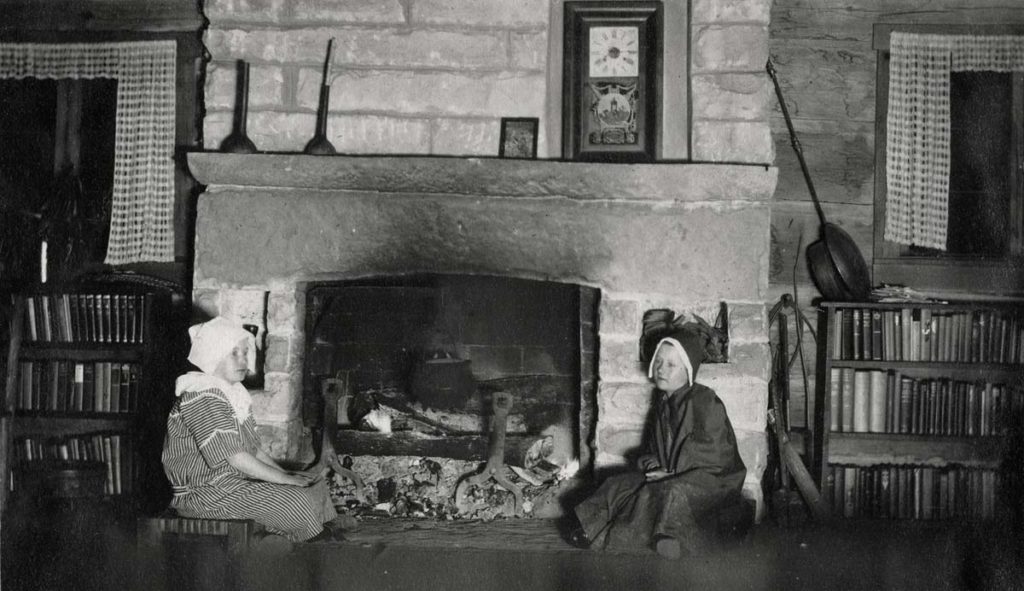
Big Log fireplace and ‘pilgrims.'[melv_II_album_032.jpg]
On Thanksgiving Day, in spite of showers, people began arriving early, and we had 300 here, including the school family. The children’s pageant had to be given indoors, with the audience packed in so close that you only saw their faces. Cam was Governor [p.11] Bradford, making the first Thanksgiving proclamation – “Good people all, let’s give thanks to God, an’ everyone go out and git something to eat.” The children just had paper collars and cuffs to give the idea of Pilgrims. Then came Pine Mountain scenes, the Indian village, the settling of Adrian Metcalf in the valley, and of Uncle William’s family twenty-five years ago. There is a story that Uncle William once refused a large price for this land, which was offered him by a mysterious stranger from Tennessee, who wanted to make a resort of it, based perhaps on a sulphur spring on the Creech land.
Then scenes of the school today, classes, making cornbread and weighing milk, song-ballets and Mr. [Cecil] Sharp‘s “Gathering Peascods” dance.
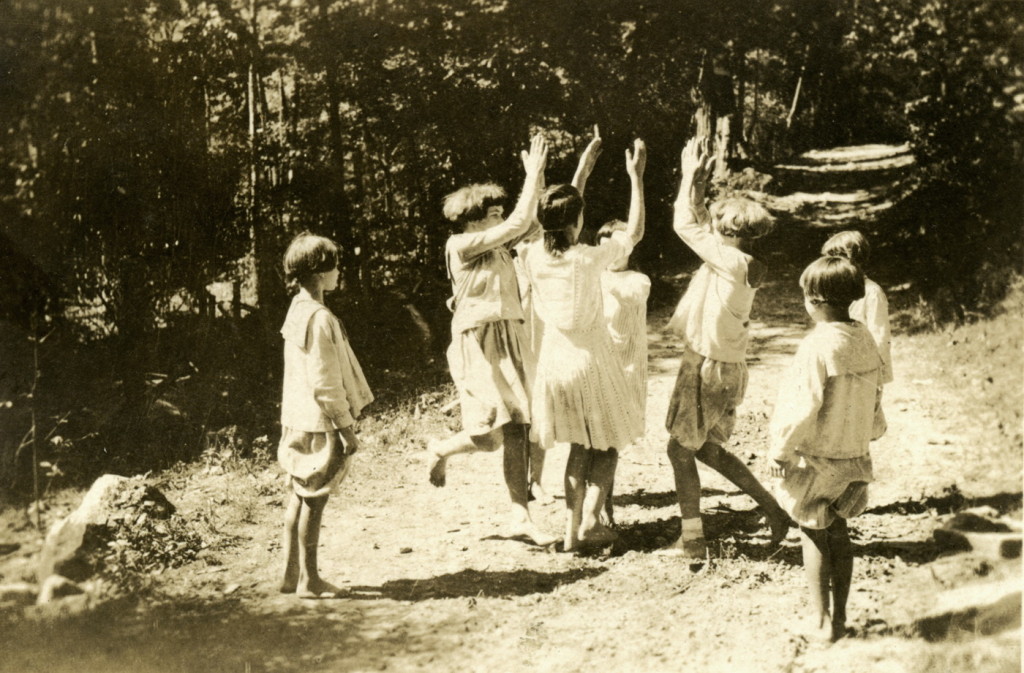
“Gathering Peascods,” c. 1920’s
By the time the serious part of the program arrived, it was way past dinner time and the sermon turned into a tabulation of things to be thankful for, and the war was omitted from the talk, and Mr. Campbell of the Sage Foundation who is visiting us with his wife, [Olive Dame Campbell] entirely forgot to dedicate the building. However, that will be properly done later on.
All the grown-ups were served in the dining room with stew, cornbread, coffee, peanuts and candy, and the children ate outside on the big porches. We feel that we have entertained the community for the first time, because they sat down to dinner with us. There were ten round tables with ten at each, one long one, on planks set on horses, through the center of the room, and white cloths on them all.
Green Cornett from Line Fork brought his fiddle, and all the renowned dancers danced jigs. He also played for the set-running in the afternoon. The boys and girls ran from one-thirty to five, some of them without stopping, while the fiddle played and another man with two little sticks beat the rhythm on the fiddler’s strings. The children all had games on the playground. Early supper (mince pie!) at our own houses.
1917 December. [044-p.11] Christmas preparations. The rehearsal for the play in Sunday School, listening to Santa’s bells on the mountain in the evening, decorating, decorating…
Christmas preparations. The rehearsal of the play in Sunday School, listening to Santa’s bells on the mountain in the evening, decorating, decorating. In my room I have great bunches of holly, laurel and hemlock with tiny little cones in each of my three casement windows, with a great basket of the same on my bookcase. A lovely little wreath on my door onto the porch, with little cedar trees on each side of it. I gathered all these greens this afternoon, out for a gallop on Bobby. Tonight we had a procession of animals from the fireplace across the hearth and up to the Christmas Tree. Such shouts of delight when the children were let into the room after supper!
In the dining room fir trees are tied to all the posts, wreaths in every one of the rows of windows, and ropes of laurel wound about the posts supporting the balcony. A fine setting for the appearance of the Laurel House girls with their carol.
1917 December 19. [043-p.10] We are in the thick of Christmas joys and moving into the School-house. On Monday the offices were moved, and for half a day we felt torn up by the roots…
We are in the thick of Christmas joys and moving into the School-house [Mary Sinclair Burkham Memorial School House I] On Monday the offices were moved, and for half a day we felt torn up by the roots, after all these months at Old Log, cold and dark and dirty though it was. But now that we’ve worked a little in the new offices we realize their blessings — steam heat, a good light, compactness and privacy. I have a little room 3 x 14 and quite high-studded, with a window looking across the tops of little pine trees on the schoolhouse hill, to the bottom lands, and down Greasy, hill after hill unfolding. The walls of the office are chestnut, stained with a fumed oak preparation. On the wall is a fine woven hanging.
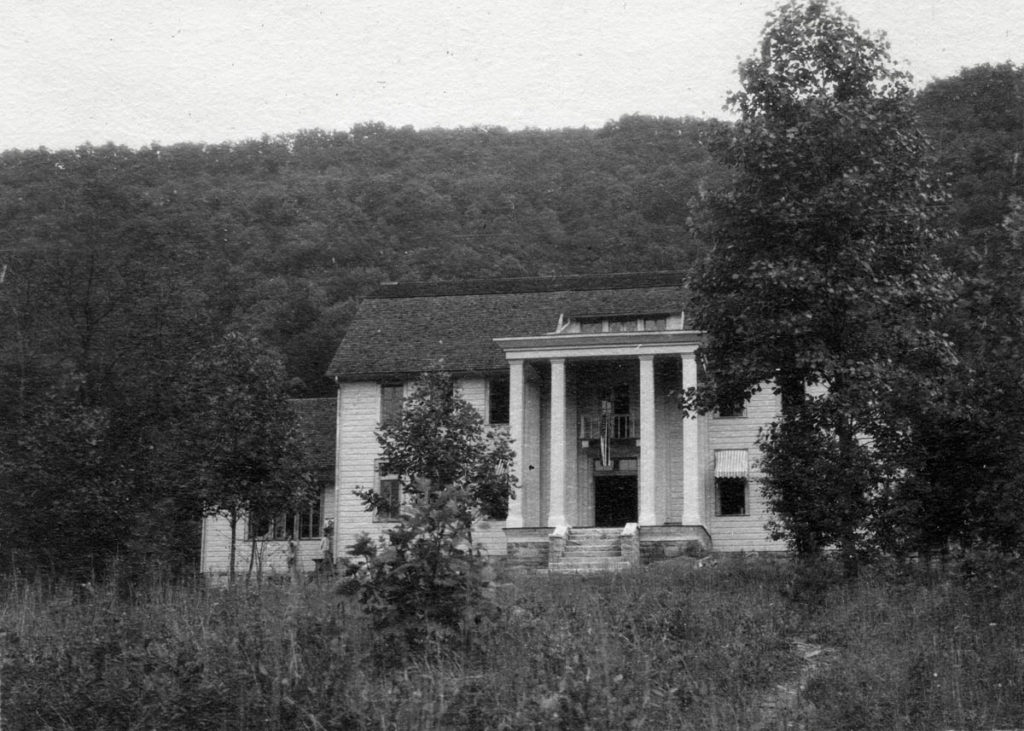
Mary Sinclair Burkham School House I.
The little boys are getting ready to sing “Here We Come A-Wassailing” in the dining room on Christmas Eve. We’ve just been waiting for this first Christmas in the lovely new room. We are going to have a “working” to decorate it, and at supper-time the eight little girls who live in Laurel House are going to appear on the balcony, singing “The Holly and the Ivy,“ and as they sing, they will tie great bunches of holly and “ivy” (mountain name for laurel) along the railing and cross beams. They will wear white dresses and red ribbons, and we shall all eat by candle-light. All this is a dead secret, — so much excitement.
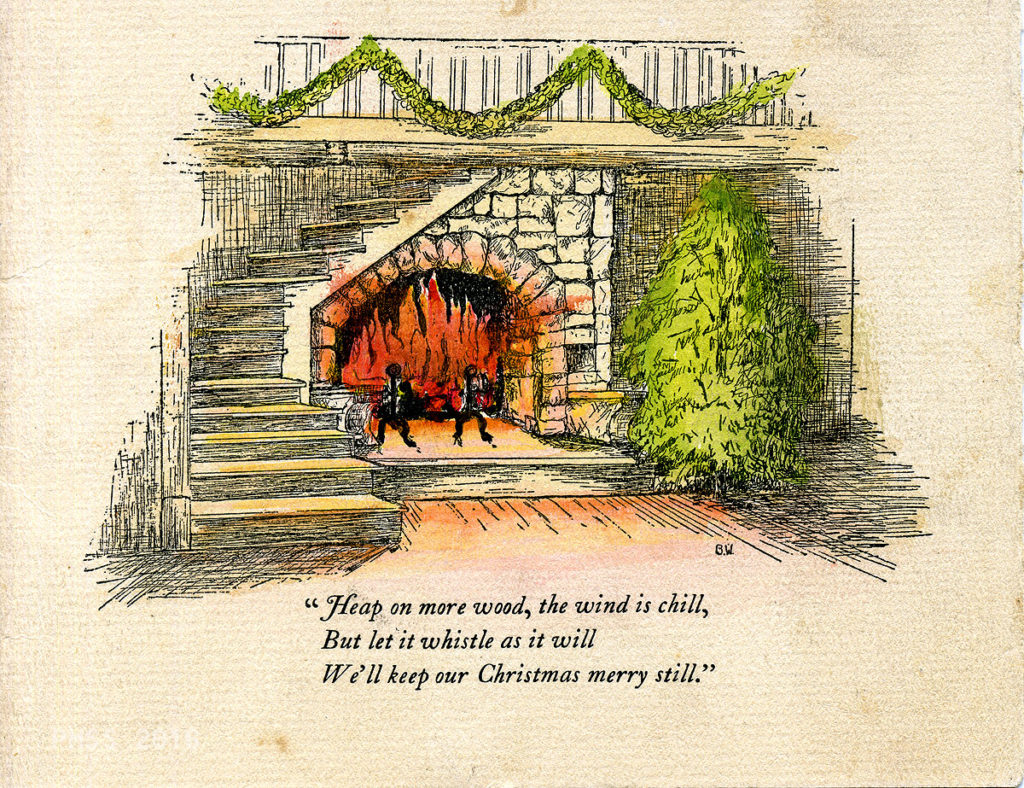
Christmas card from Bessie Wallace, the artist [?]. “Laurel House fireplace, 1932.” [neff_vennie_017]
GALLERY: Evelyn K. Wells 1917 Transcriptions
- Evelyn K. Wells 1917 Transcriptions. [well_hist_034.jpg]
- Evelyn K. Wells 1917 Transcriptions. [well_hist_035.jpg]
- Evelyn K. Wells 1917 Transcriptions. [well_hist_036.jpg]
- Evelyn K. Wells 1917 Transcriptions. [well_hist_037.jpg]
- Evelyn K. Wells 1917 Transcriptions. [well_hist_038.jpg]
- Evelyn K. Wells 1917 Transcriptions. [well_hist_039.jpg]
- Evelyn K. Wells 1917 Transcriptions. [well_hist_040.jpg]
- Evelyn K. Wells 1917 Transcriptions. [well_hist_041.jpg]
- Evelyn K. Wells 1917 Transcriptions. [well_hist_042.jpg]
- Evelyn K. Wells 1917 Transcriptions. [well_hist_043.jpg]
- Evelyn K. Wells 1917 Transcriptions. [well_hist_044.jpg]
SEE:
EVELYN K. WELLS BIOGRAPHY
EVELYN K. WELLS GUIDE TO ADMINISTRATIVE CORRESPONDENCE
EVELYN K. WELLS RECORD OF PINE MOUNTAIN SETTLEMENT SCHOOL 1913-1928 [INDEX] (Early in-depth history of Pine Mountain Settlement School)
EVELYN K. WELLS, GUIDE EXCERPTS FROM LETTERS HOME
EVELYN K. WELLS 1915 EXCERPTS
EVELYN K. WELLS 1915 EXCERPTS Horseback to Hindman
EVELYN K. WELLS 1916 EXCERPTS
EVELYN K. WELLS 1917 EXCERPTS
EVELYN K. WELLS 1918 EXCERPTS
EVELYN K. WELLS 1919 EXCERPTS
EVELYN K. WELLS PUBLICATIONS
The Ballad Tree: A Study of British and American Ballads, Their Folklore, Verse and Music, Together with Sixty Traditional Ballads and Their Tunes. New York: Ronald Press, 1950. Print.
[See Bibliography below for a listing of additional publications.]
EVELYN K. WELLS, “A Little True Blue American, 1920”
EVELYN K. WELLS TALKS
EVELYN K. WELLS, TALK Harvard University July 1, 1955

